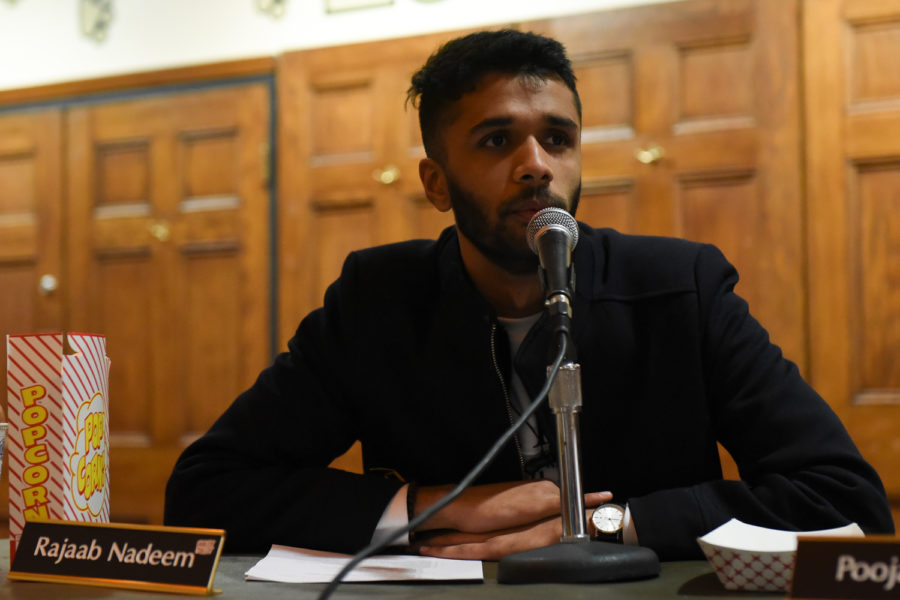SGB pushes stricter laws on firearm sales
Knox Coulter | Staff Photographer
Board member Rajaab Nadeem discusses gun regulations at SGB’s weekly meeting Tuesday evening.
December 5, 2018
After more than a month of trying to help Pittsburgh heal from the Tree of Life shooting, Pitt’s Student Government Board has set its sights on making change in Washington.
In an open letter to representatives and lawmakers, the board called for stricter laws surrounding the ability to purchase assault weapons to prevent similar tragedies. At SGB’s weekly public meeting Tuesday night, President Maggie Kennedy said the board will deliver the statement to legislators early in 2019.
“Action must … be taken by our lawmakers to create policy that actively prevents future tragedies,” the statement read. “It is time for our lawmakers to put aside partisanship. This is not a matter of Democratic or Republican affiliation, but rather of safeguarding the most fundamental principles upon which our nation was built.”
SGB’s statement called for legislators to pursue “stricter regulation on the sale of assault weapons,” including the expansion of background check requirements, closure of the “gun show loophole” and the ban of bump stocks.
The last of these, at least, is likely already on its way — the Trump administration has announced its intent to roll out a ban on bump stocks in the near future. Kennedy cited other comments from Sen. Pat Toomey, R-Pa., and President Donald Trump that echo the measures detailed in SGB’s statement.
According to Kennedy, the board has searched for ways to aid the community since the Tree of Life shooting. Board member Rajaab Nadeem suggested calling for gun regulations and the board agreed to pursue it. The statement was written primarily by Kennedy and SGB Operations Director Jon Shaiken, who consulted with SGB adviser Steve Anderson and Dean of Students Kenyon Bonner in the drafting process.
“Per the advice of a couple of experts in Washington, we are hopefully going to be utilizing the people who have signed on from across the country to send it to their representatives because frankly it just means more [to legislators] if it’s coming from their own constituents,” Shaiken said.
After publishing the statement on Facebook Monday morning, the board asked readers to sign a petition supporting the regulations. The petition passed 250 signatures Tuesday afternoon, and the names of all who sign will be added to the final version of the statement that is distributed to legislators. But Kennedy said a large number of signatures isn’t necessary for the statement to serve its purpose.
“It’s cool to get a lot of signatures, but at the end of the day, we hope that somebody who has the power to pass something legislatively will listen,” Kennedy said. “If we only get 300, but a legislator sees this and decides to revisit a bill that’s already been brought up or introduce a new bill that would follow up on these goals we’ve set up, that would be amazing.”
But sometimes there is power in numbers — especially during election season. Elections Committee Chair Katie McLaughlin introduced Board Bill 61 during the meeting, an updated version of SGB’s Elections Code. Voting in this spring’s board election will take place at the URL elections.pitt.edu instead of its old home, my.pitt.edu. Along with a new web address for elections, the new Bill 61 proposes considerable election finance reform. SGB will vote on the bill after returning from break.
SGB has amended its elections procedures before, McLaughlin said, but these changes have tended to address fixing the bill’s grammar and formatting rather than altering its content. This year, the Elections Committee is trying to implement more significant changes that will make election procedures more fair.
“This year, we really focused on changing the context of the bill. We’re trying to make the election more accessible to low-income students,” McLaughlin said.
Running for board is an expensive endeavor. Campaign spending is capped at $1,200, and individual students often spend hundreds of dollars out of pocket to be competitive candidates, according to McLaughlin. Under the new bill, the deposit students must pay to run for board would be lowered from $100 to $50 and the Elections Committee would offer financial aid to candidates that require it.
“Originally, no SGB committee could give money to any campaign. We’re looking to change that so the Elections Committee is able to reimburse candidates on a need basis, individually,” McLaughlin said. “We’re not throwing out any specific numbers because we don’t know how many people are going to be applying, but we’re hoping to give everybody who applies something to ease that burden in any way we can.”
The Diversity and Inclusion Committee hopes to pursue its own initiative in the spring term — closing the distance between students and the Pitt Police. Tabitha Barnes, who chairs the committee, met with a representative from Pitt Police last week to address concerns regarding the lack of a strong line of communication from police to students.
“We’re trying to find a way where we can establish a clearer mode of communication and improve positive interaction,” Barnes said. “Our committee is also brainstorming ways in which we can help them do that.”
Barnes plans to campaign for greater student awareness of Pitt Police resource and hopes that, in turn, Pitt Police will have an involvement in SGB programming.
“We’re interested in is getting [Pitt Police] involved in Student Government Board initiatives like Neighbors Week,” Barnes said. “They’ve agreed to be a part of that and kind of teach from a Pitt Police perspective, how to be a great neighbor.”
Allocations
Panther Hurling Club requested $2,000 to attend a tournament. The board approved $1,428 and denied $572.
The Filipino Students Association requested $9736.88 to host a speaker. The board approved in full.
Pitches and Tones requested $2,093.49 to purchase equipment. The board approved in full.



